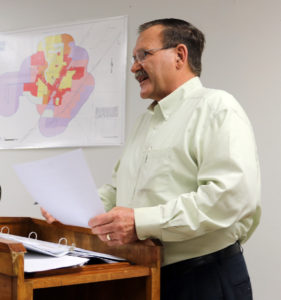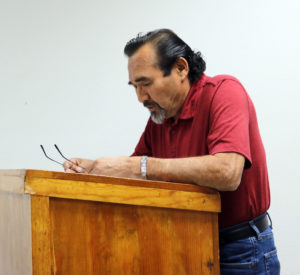
The Devine City Council’s decision to deny David Ehlinger’s request to allow his company, Aviation Fuels Inc., to sell fuel at the municipal airport in favor of the City selling fuel itself came down to numbers.
At the Regular Council meeting on Feb. 20, Ehlinger stated that the City of Castroville sold 37,561 gallons of 100LL (low lead) fuel, also known as avgas.
At the Special meeting last Monday, Mar. 5, Council had a proposal provided by Ehlinger that included the following estimates of Castroville’s fuel sales in fiscal year 2016-2017: 43,918 actual gallons sold; $181,847 actual sales; $164,482 actual cost; $17,365 reported gross profit; $4.14 annual average sales/gallon; $3.75 annual average cost/gallon; $21,198 estimated overhead; and a total estimated loss of $3,833.
Mayor Bill Herring read aloud from a letter from Castroville City Administrator Marie Gelles addressing Ehlinger’s figures.
“The number [Ehlinger] was provided for the number of gallons of 100LL/avgas sold was an estimated 37,561 gallons,” Gelles wrote. “As for the actual sales dollars, actual cost, reported gross profit, annual average for sales/gallon and cost/gallon, estimated overhead and estimated net profit/loss, those figures did not come from the Castroville Municipal Airport or the City of Castroville.”
Claudia Mora, Castroville Economic Director and Airport Manager, said that Castroville made a profit of about $40,200 on the sale of avgas.
“To my knowledge, we are not having problems, nor are we attempting to sell the fuel farm or look for a vendor or private business to operate it for us,” Mora said.
Ehlinger said that the City of Castroville provided him with figures stating that Castroville sold 37,561 gallons of avgas and 6,357 gallons of jet fuel for a total of 43,918.
“That’s what they provided me,” Ehlinger said. “Total gallons sold.”
“Who’s ‘they’?” Herring asked.
“Castroville,” Ehlinger replied. “City office of Castroville, City office of Castroville.”
“Name a person you got this from,” Herring said.
“City office, City manager,” Ehlinger said. “They’re the one that provided the information. Whether they didn’t communicate it correctly between the airport and the City office, not my problem.”
“This letter is signed by [Gelles] refuting everything you’re saying, David,” Herring said.
“Everything they told me exactly is documented in a statement they gave me,” Ehlinger said.
 Ehlinger then explained how he arrived at some of his estimates.
Ehlinger then explained how he arrived at some of his estimates.
“$181,847 was the actual sales if the annual average was $4.14 on that, and the average annual between $3.75, averaged,” Ehlinger said. “That would have been the actual sales…The cost of the fuel on the average would actually be $164,482. That’s how you come up with these estimates that I proposed to you.”
Ehlinger asked if the City had the real cut sheets of all the gallons of fuel that Castroville sold, or if their general fund had supplemented the airport.
“That’s where you should have compared it,” Ehlinger said. “Apples to apples, oranges to oranges, not just throwing it into a general fund and then separate it out later. They use other funds to help the fuel station.”
Mora stated it was all airport funds.
“See? That’s exactly right,” Ehlinger said. “It’s all airport funds. Hangar funds come in here, fuel funds come in here, put it in this one general fund and then say we made a profit. If you do proper accounting in the right manner, you’re going to itemize what your hangar rentals are bringing in as profit, and fuel profit over here likewise. And you’re not doing that.”
Mora then reiterated that Castroville’s profit of $40,200 was on fuel sales alone.
“It’s not true and it’s not accurate at they have to prove it,” Ehlinger said. “They can’t even communicate from the City to the Airport Manager with continuity, how do you expect them to communicate the gallons with continuity, Bill?”
“Well, [Mora] stands by this and I’ve known her for quite a while,” Herring said.
“Well you may have, but you’ve got to still realize you’ve got rental properties and you’ve have all the income from the structures, from the hangars, from the lots, that goes into one bundle.”
“[Mora] just stated that the profit came from fuel sales only,” Herring said.
“She said before that it was not,” Ehlinger said. “So what is it, yes or no?”
Interim City Administrator Dora Rodriguez asked Mora again if money from rentals and fuel were separate, and Mora confirmed that they are.
“It is now,” Ehlinger said. “Can you accurately say that that’s true or not? You can’t. The documents that you have, they’re not true.”
Ehlinger said before he purchased Aviation Fuels, Inc. in 2016, he was told by Devine Airport Manager Vickie Pumphrey that the Devine airport didn’t have space to install a fuel station. Ehlinger said that there was space, and provided what he described as “realistic calculations” of potential fuel sales at the Devine airport.
“You’re not going to make a lot of money but you’re providing a service to everybody,” Ehlinger said.
Ehlinger estimated making $7,000 on fuel sales with $10,000 in overhead costs. His proposal called for giving the City six cents from every gallon of fuel sold, or $1,560 with fuel sales of 26,000 gallons.
“That helps some of that $30,000 budget deficit at the Devine airport,” Ehlinger said.
He estimated it would cost the City $250,000 to install a fuel farm.
Rodriguez said that TxDot Aviation’s estimate for a 100LL tank the size Devine would need was $140,000.
“I want low-lead 100 and jet fuel,” Ehlinger said. “So you’re looking at $250,000.”
Pumphrey said that TxDot Aviation said avgas is what Devine needs at this time.
“Jet A can come in later, but right now, the low lead is what we need first,” Pumphrey said.
After discussion about the average price of fuel at airports in a 50-mile radius of Devine, Erich Ehlinger, David Ehlinger’s son, said that the Ehlingers’ figure of 43,918 gallons sold came from the City of Castroville.
“These other numbers, the sales and costs, we received from Bernie Ainslie, who I believe is on the Board of Directors at the City of Castroville,” Erich said.
“No, he is not,” Mora replied.
“I was misled on that,” Erich said. “That was our source for the other actual numbers.”
Ainslie is part of Bario Aviation, Inc., which according to the company’s website operates at both the Castroville Municipal Airport and Kelly Field.
According to Gelles, Bario Aviation, Inc., petitioned the Castroville City Council to be allowed to sell jet fuel at the Castroville airport in Feb. 2016. The Castroville Council rejected Bario Aviation, Inc.’s proposal, and in Mar. 2016, designated the City of Castroville as the jet fuel provider at the Castroville airport.
The City of Castroville currently provides jet fuel using a jet refueler truck, and according to Gelles, will finish construction of a jet fuel tank by the end of March 2018.
 “Based on [Ainslie’s] estimates of what the City of Castroville is actually receiving as a profit, they’re showing a loss,” Erich Ehlinger said. “We would hate for that to happen if the City of Devine, just because we’ve got this ball started rolling on trying to get fuel in Devine.”
“Based on [Ainslie’s] estimates of what the City of Castroville is actually receiving as a profit, they’re showing a loss,” Erich Ehlinger said. “We would hate for that to happen if the City of Devine, just because we’ve got this ball started rolling on trying to get fuel in Devine.”
“But your informant was not correct,” District 4 Councilwoman Kathy Wilkins said.
“Apparently not,” Erich Ehlinger replied.
Rodriguez recommended that the City take on the sale of fuel at the airport itself, and said that the City could use a Routine Airport Maintenance Program (RAMP) grant to help pay for the installation of a fuel farm at the airport.
The maximum amount of money that the City can apply for is $100,000, 50 percent of which will be reimbursed.
“So we can use $50,000 of it toward this fuel farm?” Herring asked.
“Yes,” Rodriguez said.
After some discussion over appropriate locations for a fuel farm to be installed at the Devine airport, Herring asked Rodriguez what TxDot Aviation’s recommendation regarding the fuel farm was.
“That it should be ours,” Rodriguez replied.
David Ehlinger pointed out that the recommendation was one from government agency to another.
“You think you’re going to make $2.00 a gallon on fuel? You’re not,” Ehlinger said. “If you really want to develop the airport, if you really want to make that $30,000 cost cut in half, or three-quarters of that, buy some hangars. Put the infrastructure into the structure and lease out your hangars. The fuel farm is not going to be your answer.”
“David, if we’re going lose money on this or not make much, why do you want to do it?” Herring asked.
“It’s another service,” Ehlinger replied. “The pilots are not gonna come here if you don’t give them the option to buy fuel locally. And you’re just telling pilots right now, ‘go away, we don’t want your business.'”
“We agree with you on that,” Herring said. “That’s why the City wants to put it in, so pilots will come here.”
“Yeah, but you can’t do it, and run it, and maintain it, and operate it without another cost,” Ehlinger said.
Mora said the Castroville airport currently has two employees, though the goal is to eventually hire more.

District 3 Councilman David Espinosa addressed his fellow Council members on the issue, and said former Airport Advisory Board Chairman Curly Brehm had spoken to him about having fuel at the airport as early as 1999.
“I have a bad taste about this,” Espinosa said. “If we do this, we’re not taking care of our citizens in that aspect.”
District 5 Councilman Cory Thompson asked how many Devine residents have leases at the airport, and those present were only able to come up with two names.
An Espinosa motion to enter into an agreement with Ehlinger to sell fuel at the airport died for lack of a second.
A Steve Lopez-David Valdez motion for the City to sell fuel at the airport passed 4-1, with Espinosa voting against.
By Marly Davis
Staff Writer